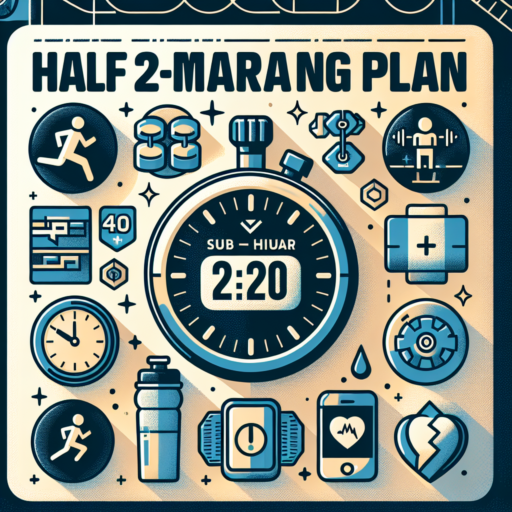How many weeks to train for sub 2 hour half-marathon?
Training for a sub 2 hour half-marathon is a goal many runners aim to achieve. The key to reaching this target lies in a well-structured training plan. For most runners, especially those with some running experience, a 12 to 16-week training program is ideal. This timeframe allows for a gradual increase in both mileage and speed, which are critical for improving endurance and pace.
Key Components of the Training Plan
- Weekly Mileage: Slowly increasing your weekly mileage is essential to build endurance. A mix of long runs, recovery runs, and easy runs should be included.
- Speed Work: Incorporate intervals, tempo runs, and hill workouts to improve your speed and aerobic capacity.
- Rest and Recovery: Adequate rest days and easy weeks are crucial to prevent overtraining and injuries.
Starting with a strong base of running 3 to 4 times a week and being comfortable with running at least 5-6 miles is recommended before embarking on a sub 2 hour half-marathon training plan. Remember, consistency is key in your training. Missing a few workouts here and there is normal, but try to stick to the plan as closely as possible to meet your goal time.
How to run a sub-2hr half-marathon?
Achieving a sub-2hr half-marathon is a benchmark goal for many runners, symbolizing a significant mastery over middle-distance running. Breaking the two-hour barrier requires a combination of discipline, strategic planning, and appropriate training. Understanding the right approach can make this challenging goal more attainable.
Build a Solid Foundation
Before embarking on a targeted training plan for a sub-2hr half-marathon, establishing a solid running foundation is essential. Ideally, you should be comfortable running at least 20-25 miles per week before intensifying your training. Increasing your weekly mileage gradually, focusing on a mix of easy runs, long runs, and recovery sessions, helps build endurance without risking injury. Consistency in your training regimen lays the groundwork for the more intense workouts to come.
Incorporate Speed and Tempo Work
Once you have a solid base, incorporating speed work and tempo runs into your training is crucial. Interval training, such as 400m repeats at a pace faster than your target half-marathon pace, improves running economy and speed. Similarly, tempo runs, where you run at a «comfortably hard» pace for a set distance or time, boost your lactate threshold, allowing you to maintain your goal pace for longer periods without fatigue. Regularly including these workouts in your training plan will sharpen your speed and endurance, key components for finishing under two hours.
Remember, achieving a sub-2hr half-marathon is not only about hard work and dedication but also about smart training and recovery. Listen to your body, and don’t shy away from taking rest days when needed. With the right approach, the sub-2hr finish line isn’t just a dream—it’s a milestone waiting to be achieved.
What pace is a 21km race in 2 hours?
Completing a 21km race, often recognized as a half-marathon, in 2 hours requires maintaining a consistent and strategic pace throughout the entire distance. This pacing strategy is crucial for both new and experienced runners aiming to hit this specific time goal. Understanding the required pace can help in planning the race strategy, including how to manage energy reserves and when to push harder.
To calculate the necessary pace for completing a 21km race in 2 hours, you divide the total race distance by the desired race completion time. This calculation reveals that achieving this target time translates to maintaining an average pace of approximately 5 minutes and 41 seconds per kilometer (5:41/km) or about 9 minutes and 9 seconds per mile (9:09/mi). This pace must be sustained from start to finish to accomplish the race in the desired two-hour mark.
Focusing on maintaining this pace requires not only physical preparation but also mental readiness. Training should incorporate varied workouts that include long, slow runs to build endurance, tempo runs to adjust to holding a consistent pace, and interval training to improve speed and recovery. Equally, understanding your body’s signals and knowing when to push the pace or take it slightly easier can make a significant difference in achieving a 2-hour finish for a 21km race.
No se han encontrado productos.
Can you do a half-marathon in 8 weeks?
Embarking on a half-marathon journey is a monumental step for any runner, whether you’re a seasoned pro or lacing up for the first time. The common question many ask is, «Can you do a half-marathon in 8 weeks?» The straightforward answer is, yes, but it comes with a caveat. Success in such a short timeframe hinges on your current fitness level, running background, and commitment to a rigorous training schedule.
To achieve this goal, you’ll need a well-structured plan that gradually increases your mileage, allowing your body to adapt without the risk of injury. Training programs for beginners usually consist of running three to four times a week, interspersed with cross-training or rest days to promote recovery. It is critical to listen to your body throughout this period, ensuring you’re pushing yourself without overdoing it. Adequate sleep, nutrition, and hydration play non-negotiable roles in your training journey.
Another aspect to consider is incorporating different types of runs into your training. These include long runs, to build endurance; tempo runs, to increase your lactate threshold; and interval training, to enhance your running speed and efficiency. Each serves a unique purpose and contributes to preparing your body for the 13.1 miles ahead. Below are examples of a weekly training schedule:
- Monday: Rest or gentle yoga
- Tuesday: Tempo run (begin with 20 minutes and increase gradually)
- Wednesday: Short, easy run
- Thursday: Interval training
- Friday: Rest day
- Saturday: Long, slow distance run (start with 4 miles and increase by 1 mile each week)
- Sunday: Cross-training or rest
Undertaking a half-marathon in just 8 weeks is ambitious, but with the right preparation, mindset, and dedication, it’s certainly within the realm of possibility. Remember, achieving this goal is as much about the journey as it is the finish line. Listen to your body, adjust your plan as needed, and approach your training with optimism and tenacity.




